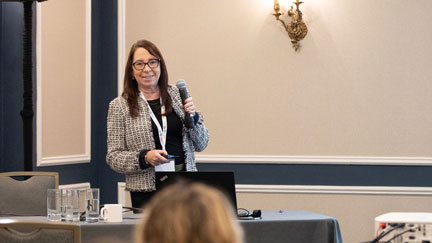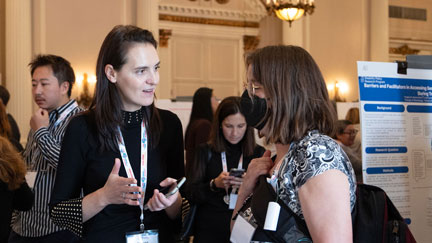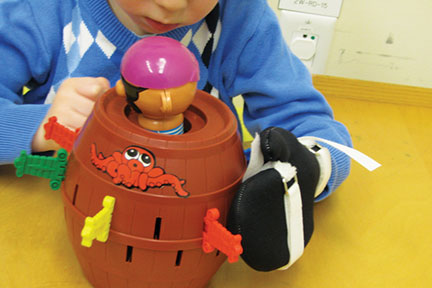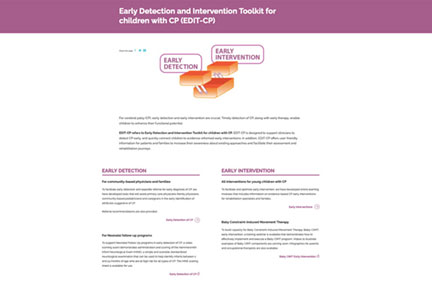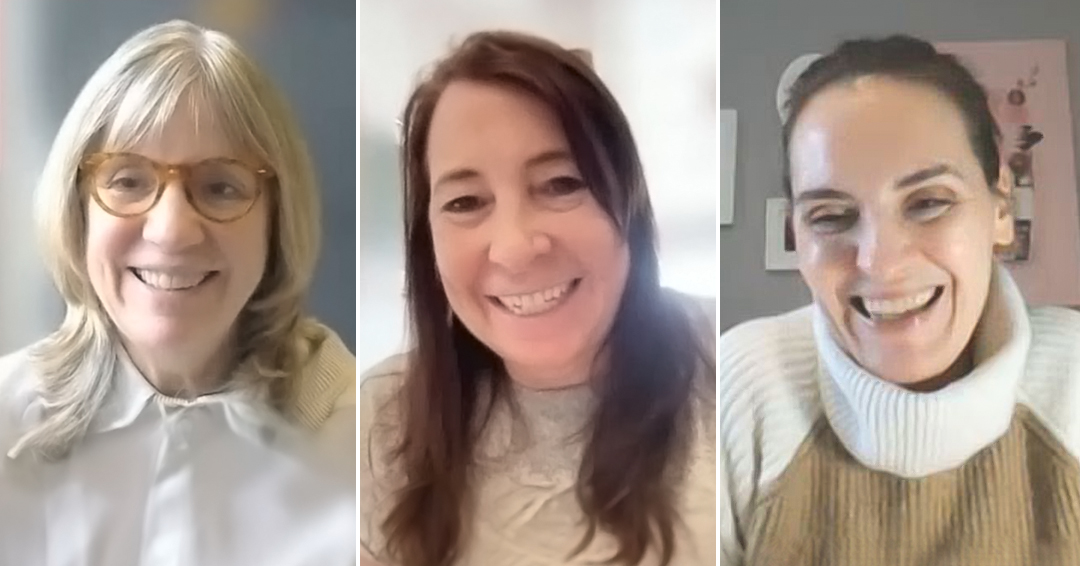
Researcher highlight: Dr. Darcy Fehlings, Dr. Annette Majnemer and Dr. Tatiana Ogourtsova lead this innovative project, funded by Kids Brain Health Network
A team of Canadian researchers and clinicians have created the first-ever toolkit for early identification and treatment of cerebral palsy (CP). The Early Detection and Intervention Tools for CP (EDIT-CP) toolkit is freely available to all neonatal follow-up specialists, family practitioners, rehabilitation specialists, and families.
Why Canada needs EDIT-CP: Health and happiness for children and families
More than 80,000 Canadians currently live with CP, one of the most common physical disabilities in childhood, affecting 1 in 500 children. People with CP have a physical disability and challenges with motor skills, which are unique to each person. They may also have difficulty speaking, chewing and swallowing, and sometimes experience developmental delays such as learning challenges.
When infants are diagnosed before their first birthday, the available treatments help optimize each child’s functional potential at a time when the brain is still in the early stages of growth and development. On average, children in Canada are diagnosed with CP at 18.9 months old, with many diagnosed at more than two years of age. This average delay in identification of more than six months means treatment is delayed, which can have lasting impacts. Children and families often face many practical difficulties with the complexities of navigating the healthcare system and accessing supports to help them thrive. There is a substantial learning curve involved in understanding what each child needs, what kind of therapists or doctors they need to go to, and where in the community they can go for help. Families may also experience financial stress, particularly if they need special equipment such as mobility devices, power wheelchairs, and adaptations to make their homes more accessible. Many families also turn to private-pay services over the public healthcare system to access adequate care.
“Even though receiving a diagnosis of cerebral palsy can be challenging, families always want to know as soon as possible, because it empowers them to move forward with action,” says Dr. Darcy Fehlings, a developmental pediatrician at Holland Bloorview Kids Rehabilitation Hospital and professor at the University of Toronto. “If we can provide evidence-informed therapies sooner, we know that they will have more impact,” she adds. “And then that can help to support the child’s functioning and optimize the child’s abilities.”
The purpose of the EDIT-CP project is to support the happiness and health of children with CP and their families
“Understanding each child’s strengths, and the ways we can help promote their family’s health allows us to really set them on the best possible journey together,” says Dr. Annette Majnemer, an occupational therapist with doctoral training in the neurosciences. She is also a professor at McGill University and senior scientist at the Research Institute of the McGill University Health Centre, and Darcy’s longtime collaborator. “If a family isn’t distressed, frustrated, discouraged or afraid, and if they understand what’s happening, if they are coping well, and if they have support, it has a healthy effect on everyone.”
Dr. Tatiana Ogourtsova, is an occupational therapist who specializes in neurorehabilitation, and an assistant professor at McGill University who studied under Annette’s supervision during her postdoctoral training. Through Tatiana’s work at a Québec rehabilitation centre, she sees children and families coping with mental health challenges due to grief, social isolation, and the stigma of living with CP. “I do see families coming for therapy there,” says Tatiana, “And a lot of them are socially isolated because there’s still some stigma attached to CP, and not a lot of people understand what it is. So, families participate less in different activities within the community.”
“Kids with CP just see themselves as kids,” says Annette. “They want to participate, and they want to be with their peers. They really value their families in terms of being there to help them in living life fully as children and adolescents.” The team behind EDIT-CP supports these aims by providing universal tools for early detection of CP, early intervention, and family support. They are making EDIT-CP widely available to neonatal follow-up specialists, family practitioners, rehabilitation specialists, and families alike, across Canada, and internationally.
- Annette Majnemer presents at the 2023 Kids Brain Health Network conference in Ottawa.
- Tatiana Ogourtsova presents at the 2023 Kids Brain Health Network conference in Ottawa.
How this pan-Canadian team developed the EDIT-CP toolkit through widespread collaboration
While there has been a vast amount of research on CP during recent decades, the mobilization of knowledge into practice has been slow. Three of the primary challenges for individual researchers and clinicians are early identification of CP, early intervention, and family support.
While 50% of children with CP are born in neonatal intensive care units (NICU) and seen by neonatal follow-up specialists, about 50% are first seen by general family practitioners. Even for specialists, it can be incredibly time-consuming to study and understand the full body of research, and to discern and implement the most effective tools and treatments for young children.
“With the EDIT-CP toolkit, we’re trying to shorten that approximately 20-year timeframe from when evidence is generated to when it’s integrated into practice,” says Darcy, referring to her own career. “What’s been so rewarding about this project is we’re starting to see change in the real world within the two-year KBHN grant period, which is really exciting.”
- The EDIT-CP toolkit helps care providers offer baby constraint-induced movement therapy (Baby-CIMT) for infants as young as three months.
- The EDIT-CP toolkit is freely available online at childhooddisability.ca/edit-cp-toolkit.
Early Identification of Cerebral Palsy
The team’s solution to the challenges of early identification and intervention has involved widespread collaboration in eight Canadian provinces. “The KBHN funding has really mobilized this knowledge more effectively,” says Annette. “It’s allowed us to go directly to the knowledge users, including therapists, primary care providers, developmental pediatricians and neurologists, as well as families. We’re not just doing research in our own labs for our own purposes. We’re working with those who will ultimately benefit from it.” The EDIT-CP team has been integrating the clinical attributes that can be readily used to detect children with CP in the primary care context, within the Rourke Baby Record throughout Canada, and the ABCdaire in Québec. This approach greatly facilitates uptake by primary care providers.
The EDIT-CP team has also partnered with the Canadian Neonatal Follow-Up Network (CNFN), and has set up a Canadian community of practice for neonatologists—who have identified what would be helpful to incorporate tools into medical practice. There has been international interest, and the team has also received input from colleagues in Italy and the United Kingdom.
These collaborations have allowed for a very rapid implementation of the Hammersmith Infant Neurological Exam (HINE), now regarded internationally as a critical scoring aid for early identification of CP. During the COVID-19 pandemic, the EDIT-CP team offered webinars and online training sessions, quickly and effectively mobilizing research into practice over widespread geographical areas.
Early Intervention & Family Support for Cerebral Palsy
In addition to helping specialists and family practitioners identify CP in infants before their first birthday, the EDIT-CP toolkit provides tools for early and effective intervention to help children with CP live their best lives. “We worked in close partnership with families and front-line clinicians providing treatments to families every day,” says Tatiana. “Listening to clinicians’ perspectives, as well as the parents and caregivers really made the difference. Working with diverse people produced a toolkit that is suitable and relevant for them.”
The EDIT-CP toolkit includes educational resources for Baby Constraint-Induced Movement Therapy (Baby-CIMT) to support the 38% of children with hemiplegic CP. The toolkit also offers information about more than 20 existing rehabilitation interventions for young children with CP, from specialist treatments to exercises families can do together at home.
What’s next for the EDIT-CP toolkit
Darcy, Annette and Tatiana are committed to continuing their work with partners across the country and internationally to mobilize the EDIT-CP toolkit worldwide. For example, a study is currently underway offering training to rehabilitation specialists on the use and the implementation of EDIT-CP in their daily clinical practice. Care providers who are interested in implementing the EDIT-CP toolkit may access resources at childhooddisability.ca/edit-cp-toolkit.
This article originally appeared on the Kids Brain Health Network website.

